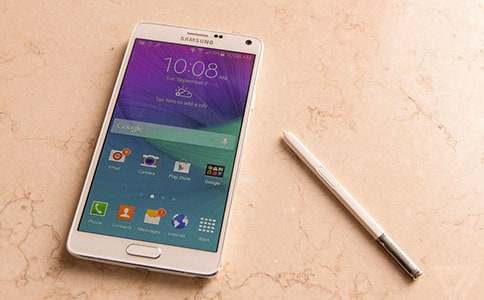智能手机影响夫妻生活双语阅读
You know how it goes: you’re trying to talk to your grandchildren, but they’re constantly checking their beeping phones. ‘I’m listening . . . ’ they insist. Except you know only too well they’re not.

At home, over dinner, you want to catch up with your husband, but he’s busy checking his emails on his iPad. He says ‘Yes’ every so often but, again, his attention is obviously elsewhere.
Part of you wonders who is messaging him so often. You feel a pang of mistrust; maybe you don’t even kiss him goodnight.
Then it occurs to you that you put an ‘X’ at the end of your text messages to each other more often than you kiss in real life.
For many of us, this behaviour is slowly becoming the new normal. But it shouldn’t: because technology is destroying real intimacy in our relationships.
I have been studying the digital world as a senior researcher at the University of Brighton since 1990, but it was six years ago when I started to notice myself spending too long on my smartphone: hours online at night and constantly responding to it in the day, even when surrounded by friends.
I realised I was beginning to get addicted — and I wasn’t the only one. So, I began studying the effects of our virtual lives on our physical relationships, and have since spoken to hundreds of couples whose partnerships have been threatened by their addiction to technology.
For some, the cause is what I call ‘wretched contentment’: spending evenings watching TV, all the while constantly checking phones without talking. It’s pleasant, but it’s not fulfilling.
As the quality of our physical connections gets diluted over time, we adjust, expecting less. We forget what real romance is. And we forget that sending kisses by email can’t replace actual intimacy.
Studies the world over have proven the same. Researchers at the University of Missouri interviewed hundreds of Facebook users aged between 18 and 82, who believed their partner’s Facebook use increased conflict in their relationship.
As the use of the site increased, the study found, so did their jealousy, leading to break-ups, cheating and divorce.
The evidence is everywhere: the more we resort to digital intimacy, the less fluent our actual intimacy becomes.
One couple’s relationship suffered when they were both promoted, and spent every evening answering emails from work, even at 11pm.
‘At first, we were answering emails from the bedroom,’ says Anne. ‘Which meant our sex life suffered. Then, my husband started working from the study next door instead. When he started texting me goodnight, instead of walking to the bedroom, I knew I was no longer a priority.’
This distance breeds mistrust. Partners worry who their loved one is talking to — often with good reason.
And an Oxford University study of 24,000 married European couples found a direct, inverse link between use of social networking sites and marital satisfaction.
The more couples read about others’ exciting lives on social media, the more likely they were to view their own with disappointment and disdain.
People can fall into ‘text’ arguments in ways they never would face-to-face. Misunderstandings are all too easy when you can’t read someone’s body language. And friendships are affected as we replace meet-ups with online communication.
The more we get out of practice at being with other human beings, the scarier physical closeness becomes, chipping away at our happiness. We all need deep communication and we’re not getting it.
Many children now Skype relatives more regularly, but visit them less. Most grandparents would prefer a call and a visit.
Technology can be a beautiful way to keep in touch, but it should be an addition, not a replacement, to real relationships.
相关内容
你可能会碰到这种情况:你想和儿孙们聊聊天,可不时震动的手机吸引了他们全部的注意力,他们口中说着“我正听着呢……” 不过你心知肚明他们根本没注意你说了什么。
要么在家中,你想在晚餐时间跟丈夫谈谈,他却一直忙着用平板收发邮件,他不时嗯嗯啊啊应答着你,但显然你说什么他根本没留意。
你很想知道是谁在这么频繁地联络他,于是因此而猜疑烦恼,连晚安吻都无心相赠。
现在的你在短信最后写“吻你”甚至比两个人真正的亲吻次数还要多。
上面提到的那些现在正在悄然改变着你我的生活,日积月累,渐成习惯。但是,我们不该让科技破坏我们的正常生活。
1990年以来,我在布莱顿大学开始了我对数字技术的相关研究,但在六年前,我发现我开始沉迷于智能手机,那种迷恋甚至到了不分时间和场合的地步。
我意识到我已然上瘾,但我绝非个例。于是我开始研究这种虚拟行为对人与人之间关系的影响,并着手调查了几百对因为智能机之瘾而遭遇婚姻危机的夫妇。
我通常把这种状态称作“可悲式满足”。一晚上都开着电视,而夫妻二人却相对无言,频看手机,这或许能带给人一时的愉快满足,却难填人类真正的空虚。
而因此日渐冷漠的现实关系,我们反到逐步适应,以至彼此之间期待渐少。我们渐渐忘却浪漫的'真谛,却可悲的未曾意识到现实世界的亲密是电子邮件中的“吻”所不能代替的。
相关研究也取得了同样的结果,密苏里州立大学的研究人员调查了几百名年龄在18岁至82岁的Facebook用户,这些用户认为由于伴侣们使用Facebook这种社交网络导致了彼此失和。
研究人员发现,使用Facebook越频繁,他们之间的嫉妒情绪就愈发高涨,从而导致分手,出轨甚至离婚。
很显然,我们沉浸在虚拟世界的时间越多,就势必导致在现实中亲密的次数越少。
如果夫妻双双升职,并因此每晚回复工作邮件到深夜,就必然会妨害到夫妻关系。
“一开始,我们还在卧室回复邮件,这使我们的夫妻生活受到影响,”安娜说,“然后我丈夫开始移到了隔壁房间工作,接着他连卧室都不进来了,直接用短信道晚安,我明白他已经不在乎我了。”
距离产生猜疑,人们难免担心他们的伴侣正在同别人打得火热。
牛津大学通过对2.4万对欧洲已婚夫妇的调查发现,社交网络的使用频率与婚姻满意度称反比。
若情侣们经常在网站上看到别人大秀恩爱,他们就会反观自己的不如意于是更加不满。
人们极易于沉迷在互不见面的短信交流中,而在无法看到肢体语言的情况下,产生误会轻而易举。这种在线交流也会对友情有一定影响。
人类如果长时间离群索居,很容易自我封闭,消减幸福感。故而我们需要深度交流。
如今的许多孩子通常用Skype(一种网络电话软件)与亲人沟通,却极少亲自看望亲人,但大部分的长辈更喜欢他们本人来看他们。
技术本是沟通的美丽桥梁,然而对人与人之间的关系而言,它终究只是附属,并非代替。
【智能手机影响夫妻生活双语阅读】相关文章:
双语阅读03-30
精选双语阅读09-19
双语阅读:搞笑双语格言06-26
阅读好书双语阅读04-05
英语双语阅读07-27
中英双语阅读精选04-06
新鲜的双语阅读04-07
世博会双语阅读06-25
双语阅读: 微笑06-23